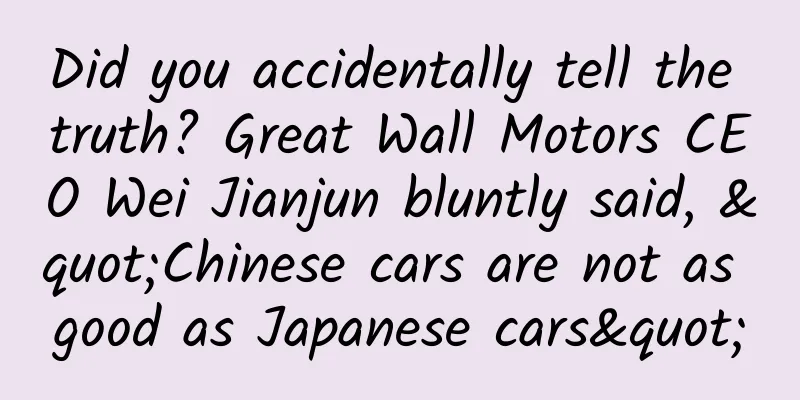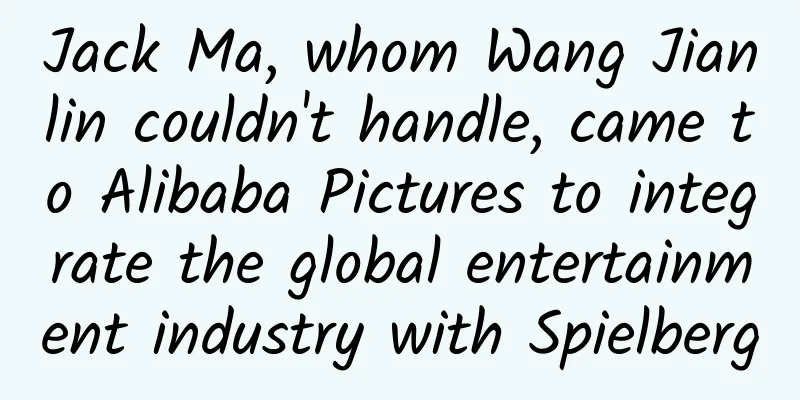Did you accidentally tell the truth? Great Wall Motors CEO Wei Jianjun bluntly said, "Chinese cars are not as good as Japanese cars"

|
Recently, Wei Jianjun, Chairman of Great Wall Motors, had a conversation with Deng Qingxu, CEO of Sina Finance, which attracted wide attention. During the conversation, Wei Jianjun bluntly stated that "the quality of domestic cars has improved rapidly, but there is still a gap with Japanese cars", and put forward three major points: "Chinese electric cars have no core technology, the quality is far inferior to Japanese cars, and there is serious counterfeiting." Netizens who are used to hearing the rhetoric of "domestic products crush joint ventures" naturally find it difficult to accept such straightforward "self-analysis". This "shocking" statement instantly "exploded" on the Internet. Is this Wei Jianjun's attempt to attract attention by saying something shocking, or did he "accidentally" reveal the truth? During this exchange, Wei Jianjun mentioned: "The quality of domestic cars has improved rapidly, but there is still a gap with Japanese cars." This sentence literally means "Chinese cars are not as good as Japanese cars." Judging from the current situation of tension between domestic brands and joint ventures, Wei Jianjun's attitude towards joint ventures is very different from that of most domestic brands. Some netizens questioned whether this was because Wei Jianjun was too deeply influenced by the joint venture and had been looking up to others for too long, so he began to boost others' ambitions and destroy his own prestige. Looking back at the development history of Great Wall Motors, netizens' doubts are not groundless. In the early days of Great Wall Motors, Wei Jianjun went to Toyota's headquarters in Japan to study and was deeply influenced by Toyota's lean production model and full industrial chain model. This learning experience also had a profound impact on the subsequent development of Great Wall Motors. In addition to borrowing the production model from Toyota, Great Wall Motors' development strategy is also highly similar to Toyota's, including but not limited to the pursuit of high single-vehicle profits and high-value concepts for the entire industrial chain. Afterwards, Great Wall Motors incubated and established independent auto parts companies such as Nobo Auto, Mind Electronics, Honeycomb YiChuang and Honeycomb Energy. If we are familiar with Toyota's relevant development model, we will find that these practices of Great Wall Motors are basically the relationship between "original and replica" and Toyota's model of self-incubation and then independently operated auto parts companies. The successful reference and application of Toyota's production model and strategy has indeed brought a lot of "sweetness" to Great Wall Motors. Now, the status of Great Wall Motors is gradually improving, and it is understandable that Wei Jianjun "strongly supports" the joint venture. However, Wei Jianjun's praise for Toyota and other joint ventures may not be due to "selfish motives". The original words in the exchange were: "Although Chinese cars have taken the lead in intelligent technology, there is still a clear gap in the maturity of the quality management system and the value retention rate compared with Toyota and other internationally renowned brands." During the live broadcast of the second-generation Haval H9's launch last month, Wei Jianjun said, "We need to learn from Toyota. We do have a gap in quality and we are catching up. The second-generation Haval H9 must do its best in terms of quality and reliability." From this perspective, Wei Jianjun's focus may not be on "joint ventures are great", but on the fact that Chinese independent brands should "learn from each other's strengths and make up for their weaknesses." From another perspective, Chinese brands currently have a significant market share advantage over Japanese cars. China's strategy of overtaking on the curve was proposed only about 10 years ago. Currently, China's global market share of new energy vehicles has reached about 60%, and Great Wall Motors' achievements in domestic and overseas markets in recent years are also obvious to all. Therefore, Wei Jianjun had no need to play cozy with the joint venture brands. He probably saw the room for growth in the quality of Chinese cars and told the truth. It's just that he clearly recognized his own problems, which is not as pleasing as "overpraising". Of course, we cannot say that Wei Jianjun's views are not biased at all. During this exchange, Wei Jianjun said: "We are definitely not as good as foreign brands in traditional internal combustion engine technology. As for electric vehicles, it's not that they don't have the technology, but they just don't have the strategy. The original invention technology of our Chinese power batteries is from the United States, which originated in Japan and was developed by Koreans. But China has the best industrial chain for electric vehicles, and this is the only thing that Chinese electric vehicles are ahead of; the rest of the motors, electronic controls, and the chips we use are from the United States, but our algorithms are very good, which is something we should encourage." Among all these, the key is actually just one sentence: China's electric vehicles do not have core technology, only a leading industrial chain. Compared with directly pointing out the "quality problems" of Chinese cars, this statement is a bit "exaggerated". The birth and development of new energy vehicle related technologies can be traced back to the United States, Japan and South Korea. This statement is correct. However, as of today, the only company in the United States, Japan and South Korea that can be considered famous is Tesla. In this regard, Japan and South Korea are not even "advanced". China's independent brands grew up in the Chinese electric vehicle market where competition is the most intense. They have long been able to export technology, not to mention the innovative technologies that have already been "installed on board", such as blade batteries, Yunnian, Yisifang, Linglizard digital chassis, quasi-900V dual silicon carbide platform, etc., just look at the trend of traditional automobile giants such as Volkswagen and Audi cooperating with domestic car companies, which also confirms these big companies' recognition of China's electric vehicle technology. Being a latecomer in technology cannot be equated with not having core technology. It is not important where the original invention technology was, but who is the "dominant force" today is the most important. Just like the world's first internal combustion engine was invented by the Dutchman Huygens and improved by the French chemist Philippe Leben. But the world's dominant forces in the era of fuel vehicles are Germany and Japan. If we follow the logic of "no invention means no core technology" to conclude that Germany and Japan do not have core technology, it would be a laughing stock. However, Wei Jianjun's point of view during this conversation was surprisingly consistent with everyone's. He said: "If the products are just cheap, and the quality is extremely worrying, what will happen when they are exported? This phenomenon is very scary, and the country should crack down on it in terms of supervision and the legal system." Indeed, regardless of the competition between joint ventures and independent brands, honest operation is the bottom line that any car company should have. After all, exaggerations such as "claiming to run 1,200 kilometers but actually only running 600 kilometers" have almost become an "unspoken rule" in the industry. Even Great Wall Motors itself cannot say that it is "innocent". As early as 2021, CCTV reported that Great Wall Motors' brand Ora Good Cat had reduced its chip configuration, which also caused a public opinion storm at the time. In August this year, Great Wall Motors missed the cooperation with the State Grid Corporation of China due to "major breach of trust". The cause of the incident was that Great Wall Motors won the bid for 35 Tank 500 models, and there were differences in configuration between the delivered and the subject matter. Even though Great Wall Motors later compensated for the differences, it still left people with the impression of "reduced configuration vehicles" and "goods not matching the specifications". The State Grid Corporation of China directly announced that it would no longer accept bids from Great Wall Motors within two years. Great Wall Motors has been in the industry for many years, and Wei Jianjun's knowledge and expertise in the industry are beyond doubt. Saying that Chinese cars are not as good as Japanese cars does not necessarily mean to "put on others' prestige", but it should be his expectation for the future development of Chinese independent brands. However, some things still need to be viewed objectively. Electric vehicles and fuel vehicles are two different tracks, and it is obviously not appropriate to compare the two together. From the current development of domestic automobiles, the strength of domestic brands in products and technology needs to be recognized, and domestic brands also need to admit that we still have a lot of room for improvement in product quality, value retention rate, and honest management. It’s not a bad thing to have more entrepreneurs who “dare to speak out”, but if there were less subjectivity, it might give people more confidence. As a winner of Toutiao's Qingyun Plan and Baijiahao's Bai+ Plan, the 2019 Baidu Digital Author of the Year, the Baijiahao's Most Popular Author in the Technology Field, the 2019 Sogou Technology and Culture Author, and the 2021 Baijiahao Quarterly Influential Creator, he has won many awards, including the 2013 Sohu Best Industry Media Person, the 2015 China New Media Entrepreneurship Competition Beijing Third Place, the 2015 Guangmang Experience Award, the 2015 China New Media Entrepreneurship Competition Finals Third Place, and the 2018 Baidu Dynamic Annual Powerful Celebrity. |
<<: Why didn’t the Samsung Note 7 explode during the recall?
Recommend
The 31st car carrier joins the fleet of SAIC Motors, and the fleet is fully expanded to 7,600 parking spaces. China's largest clean energy car carrier "makes its maiden voyage"
(January 17, 2024, Shanghai) Today, the first oce...
Rogue apps are eradicated from now on? Can unified push notifications save Android from disaster?
Recently, there is a piece of news that makes And...
The famous director died suddenly of a heart attack! Early morning is the peak time for heart attacks, beware of these 4 danger signals!
According to Tibet Daily, on May 8, the famous di...
6 major problems in short video operations to increase traffic
Whether it is "content is king" or &quo...
APP Packaging Party’s Business Secrets
Low threshold, zero cost and high income have led...
From wild growth to intensive cultivation? Chinese white goods companies collectively focus on the high-end market
Data from Aowei Cloud Network shows that in 2016,...
Apple Watch has a new bug that restarts when you ask Siri about the weather
According to foreign media reports, Apple Watch h...
OPPO R7, a decade-old masterpiece with a full metal body, is now available for review
If you know that Xiaomi, a leader in the technolo...
Subjective and objective: Is the Google module phone suspended or terminated?
[[145681]] With the recent establishment of Googl...
Android 10 Go version will be launched for phones with less than 1.5GB of memory
According to foreign media reports, last year, An...
Annual output reaches 2 billion cubic meters! This 100 billion cubic meter gas field in the Sichuan Basin heads southwest
According to the Sinopec News Office, another 100...
Mergers and reorganizations between new car-making forces and traditional car companies: Aiways will acquire Landwind Automobile
Landwind Automobile, a subsidiary of Jiangling Ho...
30 Thinking Games to Ignite Your Smart Brain Video Course Baidu Netdisk Cloud
30 Thinking Games to Ignite Your Smart Brain Vide...
WeChat Moments Ads Launches oCPM, Let’s Take a Look at Its New Features
Performance advertisers often encounter this diff...









